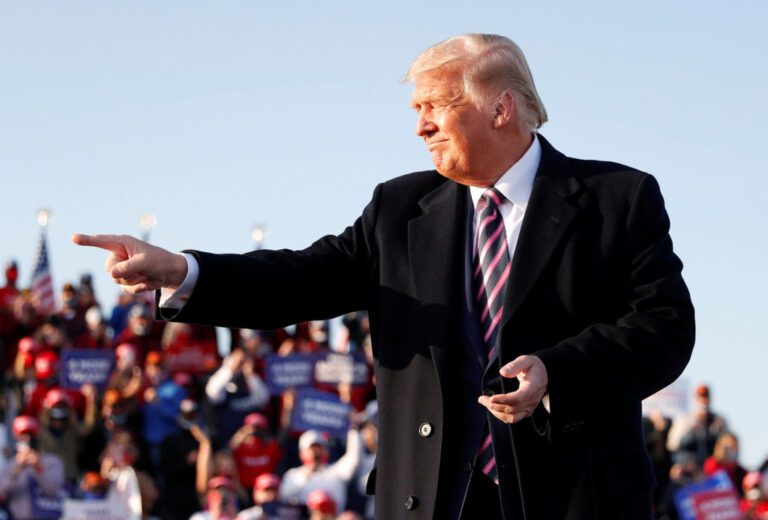US President Donald Trump holds a campaign rally at Bemidji Regional Airport in Bemidji, Minnesota, US, September 18, 2020. Photo by Tom Brenner
WASHINGTON — President Donald Trump is making a late re-election appeal to voters Saturday in Michigan and Wisconsin, states in the Upper Midwest that played a key role in his 2016 victory but may now be slipping out of his sights.
He faces headwinds not only in national polls, which show Democrat Joe Biden leading, but also in battleground state polls.
Trump's campaign has largely withdrawn from television advertising in the Midwest, moving much of its money to Sun Belt states such as Florida, North Carolina, Arizona and Georgia, as well as Pennsylvania.
Trump has scheduled events in Muskegon, Michigan, and Janesville, Wisconsin, and is making stops Sunday in Nevada and Monday in Arizona as the Nov. 3 election nears.
The president continues to be watched by his handling of the coronavirus pandemic.
U.S. President Donald Trump addresses supporters during a campaign rally at Pitt-Greenville Airport in Greenville, North Carolina, U.S., October 15, 2020. Photo by Carlos Barria, Reuters.
Wisconsin broke its record for new positive coronavirus cases on Friday — the third time that has happened in a week. The state also set record highs for daily deaths and hospitalizations last week.
Biden had no public events planned for Saturday. But in a note to supporters, campaign manager Jen O'Malley Dillon warned against complacency.
“The reality is that this race is much closer than some of the pundits we see on Twitter and on TV would indicate,” he wrote in the memo, a copy of which was obtained by The Associated Press. “If we've learned anything from 2016, it's that we can't underestimate Donald Trump or his ability to claw his way back into contention in the final days of a campaign, through whatever smears or underhand tactics he has at his disposal.”
Trump has maintained an aggressive campaign schedule despite his own recent coronavirus crisis, which hospitalized him for several days.
The difficulty of securing a second term was evident Friday when Trump campaigned in Georgia. No Republican presidential candidate has lost the state since 1992, but polls show Trump and Biden in a tight race. Trump also had to appeal to voters in Iowa, which he carried by nearly 10 percentage points four years ago.
Democratic presidential candidate and former Vice President Joe Biden, his wife Jill Biden, U.S. Senator and Democratic Vice Presidential candidate Kamala Harris and her husband Douglas Emhoff celebrate after Joe Biden accepted the 2020 Democratic presidential nomination at on the 4th and final night of the 2020 Democratic National Convention, as participants from across the country are hosted via video links from the convention's originally scheduled venue in Milwaukee, Wisconsin, U.S., August 20, 2020. Photo by Kevin Lamarque, Reuters.
The latest fundraising figures from the Trump team suggest he is likely the first sitting president in modern times to face a cash deficit. After building a huge cash advantage, his campaign spent lavishly, while Biden kept expenses low and benefited from a surge in donations that saw him raise nearly $1 billion in the past three months. That gives Biden a huge cash advantage with just two weeks before the election.
In the hours before his rallies on Saturday, Trump focused on clearing a member of his own party, Republican Sen. Ben Sasse of Nebraska.
Referring to him as “Little Ben Sasse,” Trump tweeted that the senator was “a liability to the Republican Party and an embarrassment to the Great State of Nebraska.”
The series of tweets came after Sasse told voters during a telephone town hall Wednesday that Trump “flirts with white supremacists,” mocks evangelical Christians in private and “kisses dictators' butts.”
Sasse, who is running for re-election this year in the heavily Republican state, continued to criticize the president's handling of the coronavirus and said the Trump family is treating the presidency “like a business opportunity.”
Trump on Twitter accused Sasse of being “the least effective of our 53 Republican senators and a person who really doesn't have what it takes to be great.”
Sasse's spokesman, James Wegmann, tweeted in response that Sasse is focused on helping Republicans keep their majority in the Senate — now 53-47 — and “isn't going to waste a minute on tweets.”

